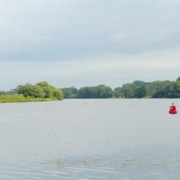What’s the deal with the Plastic Soup again?
March 15 2024 That’s what readers of news site nu.nl on their comment platform Nujij were wondering. In a recent […]
29 July 2021
A fierce battle lurks behind the unfamiliar name of the substance that is abundantly used in plastic. UV-328’s main job is to stop ultraviolet light and slow down the fragmentation process of plastic in sunlight. This stabiliser is persistent, bioaccumulated, and toxic. That the substance is found in plastic that washes up on remote beaches, in the eggs, stomach, and preen oil of birds, in the livers of the American mink, and even in mothers’ milk, not only means that it is transported across long distances, but that it is ingested by humans and animals.
UV-328 is used in large quantities: in Europe between 100 and 1,000 tons a year and in the United States four times as much. Scientists are issuing warnings and are arguing for far-reaching regulation under the Treaty of Stockholm.
The goal of the Treaty of Stockholm, which falls under the United Nations, is to protect the health of humans and the environment from persistent organic pollutants (POPs). If a substance is recognised as a POP, it is either banned or subject to stringent regulations and trade limitations.
Switzerland has proposed recognising UV-328 as a POP. This entails a long procedure and UV-328 must meet certain criteria. Apart from persistent, bioaccumulative, and toxic, this includes ‘transport across long distances.’
Banning or strictly regulating UV-328 across the world would have a major impact on the plastics industry. The substance is heavily used in a very wide range of products, including textiles, paint, cosmetics, bottles, and packaging materials.
The plastics industry wants to prevent a ban, or at least delay it. The lobby is being run by the American Chemistry Council and the European Chemical Industry Council (CEFIC) and has the ‘transport across long distances’ criterion in its sights, arguing that there is too little scientific evidence related to this criterion to justify a ban. Their argument is thus for more research. Even the EPA (Environmental Protection Agency), the environmental agency in the United States, is against a ban on UV-328 for this reason.
Plastic waste management hazards, a recent report by IPEN and International Pellet Watch, is devoting much attention to UV-328. Research by International Pellet Watch at the University of Tokyo shows that UV-328 is present in pieces of plastic that are found on remote beaches everywhere in the world. The substance is transported by plastic and microplastics that can travel huge distances in water or in the air. Even animals can transport ingested plastics across long distances. That the ‘transport across long distances’ criterion is not being met thus appears to be an opportunistic argument of the industry to sabotage the procedure that was started to ultimately achieve a ban.
In Europe, UV-328 is already recognised as a substance of great concern. As of 2023, the substance can only be used with the permission of the European Chemicals Agency (ECHA).
The concerns are not only about the spread of the substance through plastic in the environment, but the recycling of plastic also helps the spread. Recycling companies have no way of knowing which products contain UV-328 let alone of being able to keep these plastics out of the recycling process to avoid further spread. Equally, consumers cannot know if UV-328 has been added to the plastic products in their hands. If your suntan cream contains polyester, for example, you can assume that it contains UV-328, but you cannot be sure of this.
In September, a committee in Stockholm will assess a risk profile and decide whether there are enough reasons to list UV-328 as a POP and thus whether it should be banned. After that, the socio-economic arguments will be weighed up. This procedure can take two years. Should UV-328 ultimately be banned, the fact that plastic transports hazardous substances across long distances will be recognised for the first time. This will pave the way for resisting the addition of other harmful substances to plastic. In the words of Professor Hideshige Takada of International Pellet Watch at the University of Tokyo, “Regulation of UV-328 is the beginning of the end of plastics.”
March 15 2024 That’s what readers of news site nu.nl on their comment platform Nujij were wondering. In a recent […]
The first Impact Fair is Europe’s largest Impact Experience. An interactive ‘immersive’ experience of impactful examples.
The waste-export to countries outside of the EU has been restricted The Netherlands is against a carpet ban on shipping of plastic waste.
The waste-export to countries outside of the EU has been restricted The Netherlands is against a carpet ban on shipping of plastic waste.

 Who decides what is in an international plastics treaty?
Who decides what is in an international plastics treaty?